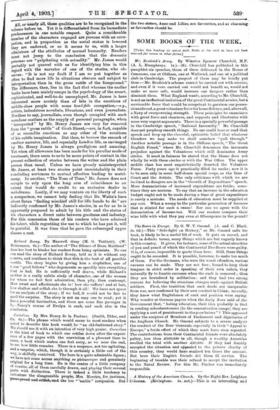SOME BOOKS OF THE WEEK.
[Under this heading we notice such Books of the week as hare 110i boos reserved for review in other forms.]
Mr. Brodrick's Army. By Winston Spencer Churchill, M.P. (A. L. Humphreys. la.)—Mr. Churchill has published in this pamphlet six speeches, three of them delivered in the House of Commons, one at Oldham, one at Wallsend, and one at a political club in Cambridge. The purport of them may be briefly put thus :—Mr. Brodrick's scheme cannot be carried out with success, and even if it were carried out would not benefit us, would not make us more safe, would increase our dangers rather than diminish them. What England wants, according to Mr. Churchill, is not an ineffectual imitation of the great Continental armies, but a, serviceable force that would be competent to garrison our posses- sions abroad, a great volunteer force for home defence, and, above all, a Navy of overpowering strength. These principles he enunciates with great force and clearness, and supports and illustrates with. some very cogent arguments. There is a specially powerful passage in the Cambridge speech, "National Insecurity." Mr. Churchill does not prophesy smooth things. No one could hear or read that speech and keep up the cheerful, optimistic belief that whatever blunders we may make we shall somehow "pull through." Another notable passage is in the Oldham speech, "The Great English Fraud," where Mr. Churchill denounces the insensate prejudice against the Volunteers which still dominates Army circles. It must in fairness be stated that the blame does not wholly lie with these circles or with the War Office. The upper middle class has most unpatriotically deserted the Volunteer Force. Forty years ago it practically filled its ranks ; now it is to be seen only in some half-dozen special corps, as the Inns of Court and the Artists. The only criticisms with which we are inclined to disagree are in the "Growth of Expenditure" speech. Mere denunciations of increased expenditure are futile; some- times they are noxious. To say that an increase in the education budget ought not to be made during a time of great expenditure is surely a mistake. The needs of education must be supplied at any cost. What a wrong to the particular generation of learners that is stinted for such a cause ! Nor can we agree with the denunciation of Income-tax. Will our readers compare their wine bills with what they pay even at fifteenpence in the pound? '










































 Previous page
Previous page